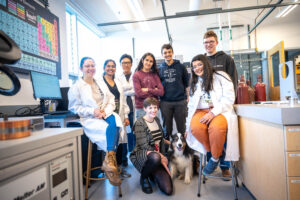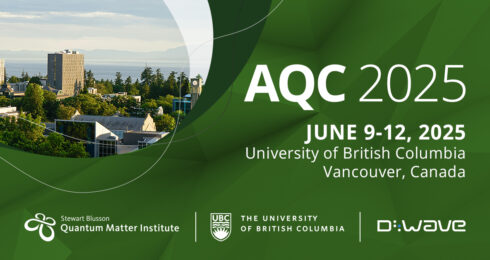Alannah Hallas, Investigator at the Stewart Blusson Quantum Matter Institute (Blusson QMI) and Assistant Professor in UBC’s Department of Physics & Astronomy, has been awarded a Killam Prize for excellence in teaching.
The Killam Teaching Prize is awarded annually to faculty nominated by students, colleagues and alumni. Alannah has exhibited a remarkable commitment to excellence in teaching, making her a deserving recipient of this award.

Image: Alannah Hallas (front) with group members Janna Machts, Gargi Kodgirwar, Dongjoon Song, Mario Ulises González Rivas, Mohamed Oudah, Joern Bannies, and Samikshya Sahu.
As an Assistant Professor, Alannah brings a unique blend of expertise in Chemistry and Physics to her role. Since joining UBC in 2019, she has made a significant impact in mentoring undergraduate and graduate students, conducting research projects, and delivering engaging lectures and classes. Her dedication to teaching and her ability to effectively communicate complex scientific concepts have inspired and influenced numerous students and colleagues.
Beyond her teaching responsibilities, Alannah is also actively involved in ground-breaking research at Blusson QMI. She is the head of Blusson QMI’s Quantum Materials Design Lab, where her team focuses on growing crystals using materials not found in nature. Examining the quantum properties of these designed crystals has already led to some exciting discoveries in the search for materials with the potential to replace more expensive natural resources.
The National Killam Program, administered by the National Research Council of Canada (NRC), aims to foster advanced study in Canada by providing financial support to scholars who contribute to scientific achievement through outstanding research. Alannah’s recognition as a recipient of the Killam Teaching Prize speaks volumes about her commitment to enhancing science education and her remarkable contributions to the field.
Alannah’s passion for science communication and her dedication to mentoring students have had a profound impact on the scientific community. Her work not only advances scientific knowledge but also prepares the next generation of researchers to contribute to educational and technological growth.
This story was originally published by the Department of Physics & Astronomy at UBC here.


